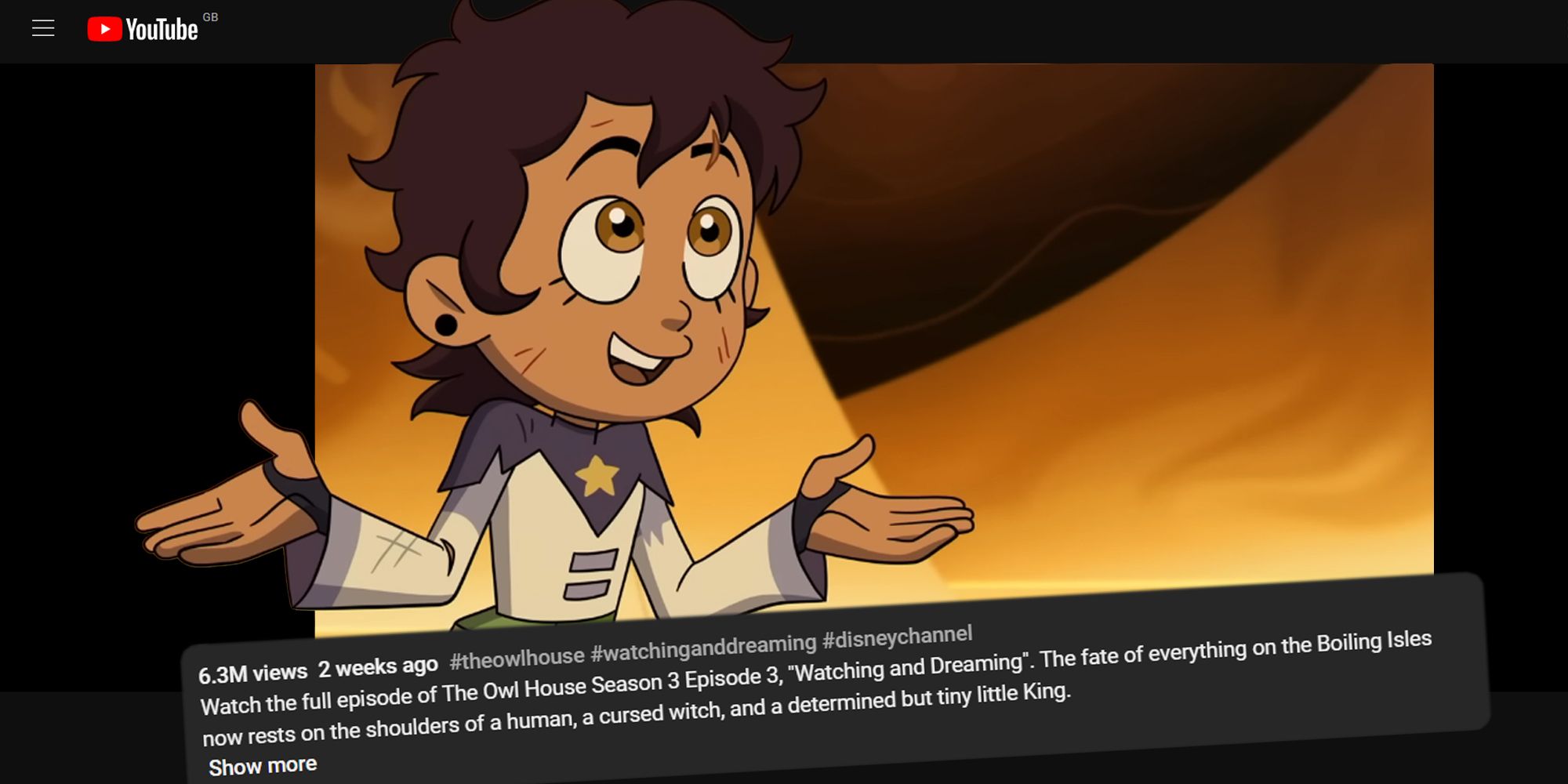The Owl House Might Have Survived If It Embraced YouTube Sooner

Since its debut earlier this month, The Owl House’s final special has amassed over six million views on YouTube. Combine that with the previous two specials and a compilation featuring all of them, and the third season is sitting pretty on a grand total of 20.8 million views across the platform. This isn’t counting traditional cable viewers or those tuning in via Disney Plus, on which the show has been regularly trending over the past several months. It’s a hit, but was never given a chance to reach this level of success before being unfairly nipped in the bud.
The Owl House was cancelled before the first season had finished airing. According to Dana Terrace, news came down the chain roughly around the time season one episode ‘Agony of a Witch’ premiered, meaning the second was likely in production amidst the pandemic, and there hadn’t really been a chance for comprehensive ratings, re-run metrics, or even an opportunity to debut on streaming and attract international audiences. The decision was made by someone in a boardroom somewhere at a time when every show on the network needed to tighten its belt, and it seems wiping The Owl House off the map completely was even easier than that.
Related: The Owl House Marks The End Of An Era For Disney Channel
I’ve moaned about the show’s cancellation countless times, even speaking to members of the cast and creators on other shows about the harsh landscape media like this is forced to contend with. Terrace was hesitant to label the show’s groundbreaking LGBTQ+ representation as the reason for its cancellation, nor its serialised narrative, but more time passed and it became harder and harder to figure out why what was quite clearly one of Disney Channel’s most popular shows in recent memory was given the axe. Now that we’ve a clearer picture of everything, the reality feels even more ridiculous, and tinged with regret.
Zeno Robinson told me that the show’s first and only panel at New York Comic Con was the biggest he’d ever seen. Packed with cosplaying fans and attended by members of the cast and Dana Terrace, hundreds were turned away at the door because there wasn’t any room to accommodate them. Disney underestimated The Owl House’s gargantuan fandom and continued success, allowing it to play second fiddle to properties with far less staying power. To me, this felt like the moment Disney realised it had messed up, and it was much too late for the ship to be corrected. People had been burnt, specials had been commissioned, and this fictional world reshaped in unchangeable ways. The Owl House never really had a chance to prove itself, so when it did, the victory that followed felt tragically hollow. Everyone involved was racing towards a premature finish line they had no control over, but wished could change.
Even when the cancellation went public it felt like a misguided idea, looking at how involved its fans were and how popular it was even in circles beyond Disney Channel’s usual reach. The Owl House tore down the walls I didn’t even know existed, both in its queer representation and serialised storytelling it entrusted to audiences with mature themes and ideas without ever sacrificing its irresistible sense of whimsy. When the three extended specials were confirmed it felt like a workable compromise, and resulted in a narrative conclusion that put creative innovation at the helm as tough decisions were made in order to wrap things up in ways that felt natural and earned.
Credit: DisneyIt came as a surprise when the entire first special was blasted on YouTube with zero delay, available for free in the majority of territories with no strings attached. For a show that was killed before its time, seeing its popularity in the black and white of views was rather sobering. Fans came in their millions to watch it again and again, drowning out the majority of other content across Disney’s official channels in terms of pure metrics. Fan discussion only fueled the fire as newcomers were introduced and discourse around each new special trended online and put the show on the map time and time again. There was no escaping it, and I hope certain individuals behind the scenes are watching this with their heads in their hands. Terrace made it clear that the extended compilations being uploaded were a thing she wasn’t even briefed on, so it’s pretty obvious The Owl House’s success is being capitalised on here. And still it got cancelled, but with it remaining so important in the zeitgeist, you have to wonder what happens next.
Calling for continuation after so much of the cast and crew are likely burned out from it all is rather selfish, even if Terrace has said that revisiting this universe in the future, regardless of the medium, is on the cards. Everyone deserves a long break, and we should take The Owl House’s unrivalled success towards the end of its run as a sign that Disney screwed up and there is more than enough demand for nuanced queer stories among young audiences who deserve to be trusted with the means to unpack deep themes and fall in love with characters designed to represent them. The Owl House was a winner in that regard, and several million views on YouTube aren’t to be sniffed at either. In another world things might have ended up differently, but I’m satisfied with how the show used with the hand it was dealt in the end.
Next: Resident Evil 4 Didn't Fail Ashley Graham













